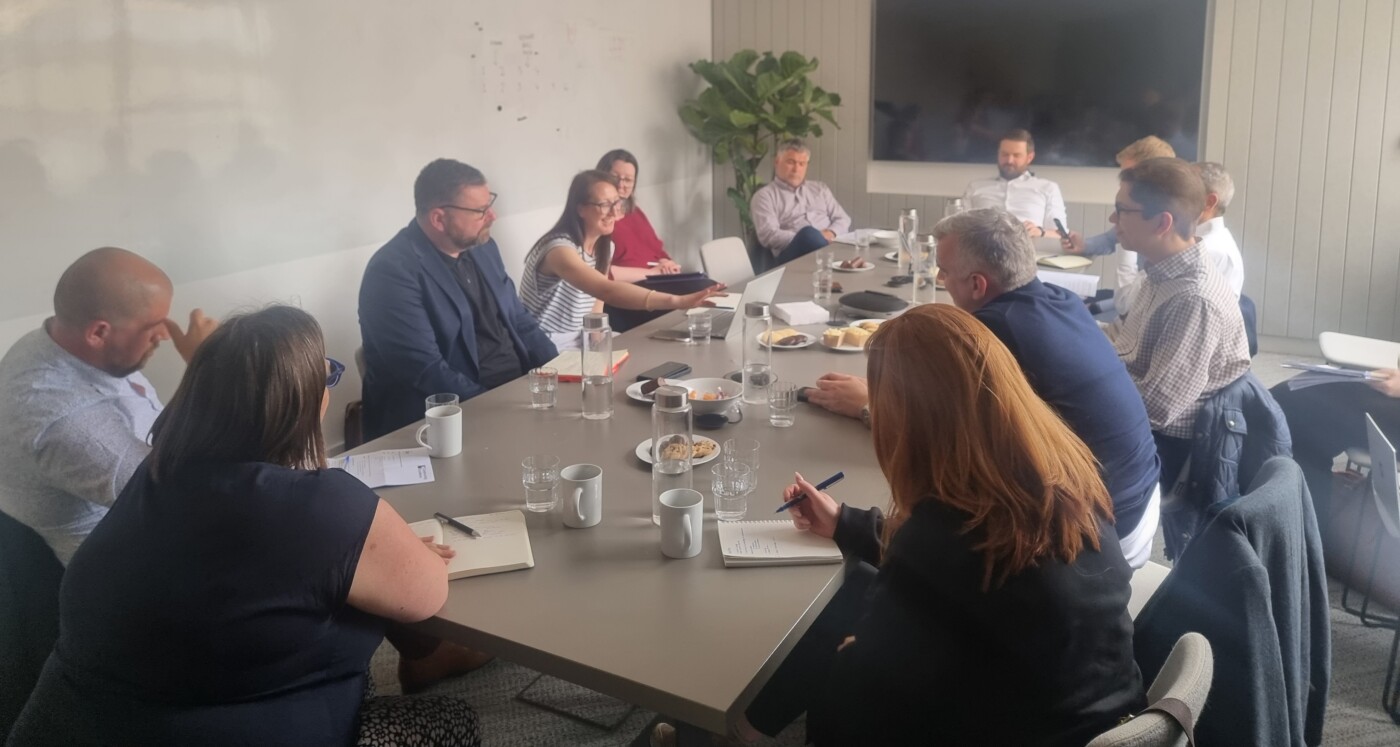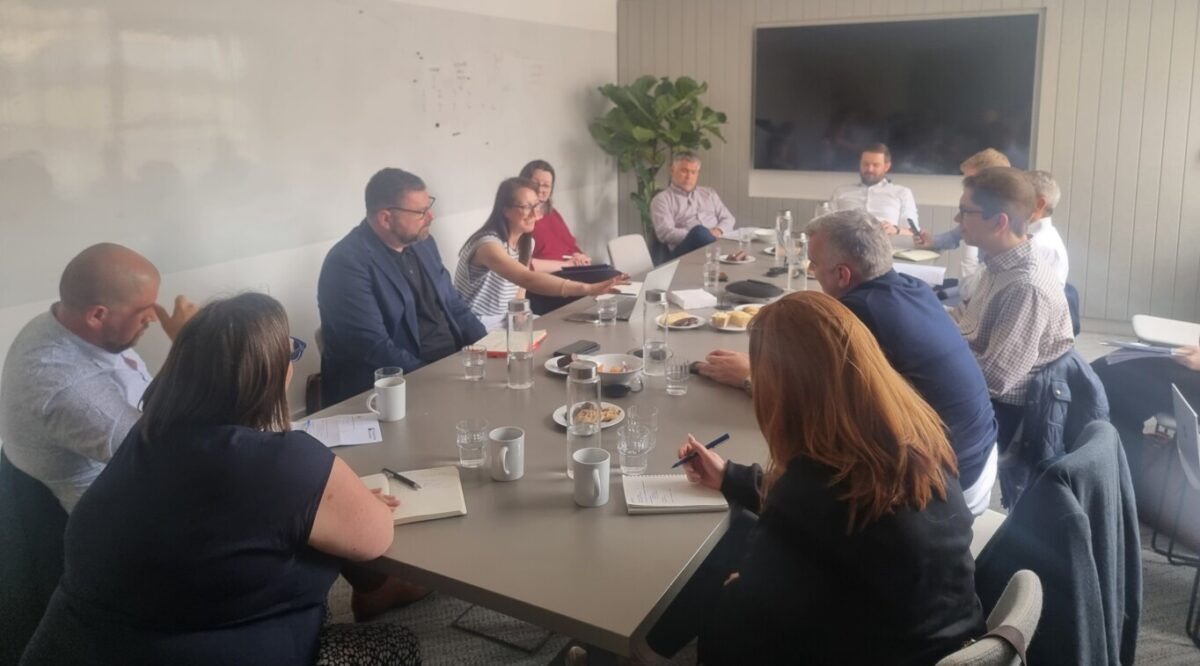On Tuesday 23rd May, Constructing Excellence was thrilled to be hosted by BIM Academy for a roundtable discussion on “The advancing digital and cultural shift of the construction industry”.
We were also fortunate to be joined by Marie Grieve, Managing Director of Costello Palmer Communications, who did a sterling job at Chairing the discussion.
Constructing Excellence
Embracing digital is a key theme for 2023 within Constructing Excellence and was one of the three areas for development that were raised at our 2023 Conference. These three key areas were:
- Business models
- Technologies
- Culture
It’s important to recognise the relationships between these elements and how they impact each other e.g., business models need to embrace the use of new technologies in order to support implementation. The key relationship that the roundtable aimed to explore was that of technology and culture. What shift needs to happen within the construction industry’s culture around new strategies and approaches in order to embrace new technologies and digital tools.
Embedding new ways of thinking and collaboration throughout an organisation is far from easy. But it is essential to adopting true, lasting digital transformation.
In this roundtable discussion, we explored and extracted key information that will drive a sustainable cultural shift. A shift that brings about a new digital-first culture for the construction industry.
BIM Academy
BIM Academy is a global digital consultancy, delivering project success and enhanced operational performance across the built environment.
BIM Academy believes digital culture creates a working environment where people and processes operate with a growth mindset – always striving to do better and they do this by responding to challenges with innovative digital solutions.
Digital cultures build resilience and enable organisations to increase sales, productivity and value even in the most challenging market conditions.
BIM Academy wanted to share some of their digital culture resilience building techniques during this roundtable and explain how they build resilience and enable people and businesses to grow.
Key Themes of the Discussion
Trust
Trust was the most mentioned theme throughout the roundtable discussion. This came in a number of forms; trusting the reliability of data and those who collect it, trusting the supply chain to provide transparent and accurate information around profit/costs, trusting other organisations and industry professionals enough to share successes, failures and learning from completed projects.
This lack of trust requires a cultural shift. It can be difficult for companies to share successes/failures as they risk damaging their reputation or giving competitors an edge. Hearing from other projects is a huge opportunity for learning that has yet to be fully optimised.
Greater trust will develop improved psychological safety which enables people to feel safe in trying new tools, sharing their successes and failures, adopting new processes, etc. Failing is a key part of learning, it is important leaders enable their workers to feel safe enough to try, fail, learn and therefore succeed.
Skills & Understanding
In order to fully embrace technology, we need to upskill the workforce. This doesn’t only mean those working at ground level, but also leaders across the industry to enable them to drive digital adoption and transformation as digital leaders. These digital leaders are key to employing a digital by default approach from within their own organisation, leading by example driving change from the boardroom.
This is also applicable to educators- it is vital that those educating the next generation have the necessary skills and understanding to deliver up-to-date and relevant learning to the leaders of tomorrow. BIM Academy have done some fantastic work around educating those who educate others.
Whilst we need to ensure people are confident and competent, we also need to make digital easy to absorb. By making the move to digital ‘frictionless’, more people will feel able to do so- embedding digital for the masses.

Data
Within the collection of data, there is another layer of trust that needs to be explored. When sharing data, it is crucial that industry professionals can trust that the data is accurate. They also need to be able to trust those who are collecting/using the data.
Data can be a huge benefit within construction as it can travel faster and further than a physical asset. This is part of the reason why data needs to be accurate but also demonstrates the importance of interoperability. Data collected in different places needs to be able to communicate with each and needs to be comparable in order to create better usability. Un-standardised data becomes unusable and therefore useless.

Collaboration
Collaboration across the supply chain is key to embracing digital. The digital tools and approaches should be outlined from project conception in order to determine how each will support successful project outcomes, therefore it is essential that all parties are on the same page, including the client.
Clients should help to drive digital adoption on a project. Though they may not know exactly what tools or software are available, by requesting a digital approach they can encourage those further down the supply chain to explore possible opportunities for digital innovation.

To Conclude
Large scale change is often achieved when there is a need to do so i.e., the COVID-19 pandemic. When there is no other choice but to change, it can be achieved effectively and quickly, this has been demonstrated numerous times throughout history.
At the moment, construction seems to have a lack of momentum, the industry needs some key drivers to kickstart a digital revolution. Could this come in the form of the Net Zero by 2050 aims or the Golden Thread? We may already have the catalyst we need to bring change to the industry.
Throughout the roundtable, the conversation returned time and again to adopting a Digital By Default approach. However, this begs the question, is construction not already Digital By Default? In today’s world, it would be highly unusual for a bid to be submitted without the use of digital, therefore, we must already have adopted a digital approach. Maybe the question now needs to be ‘how do we improve our digital offering?’




It was a delight to be involved in such a free flowing, honest and open conversation amongst a group of people (from all corners of our industry) most of whom, I had never met before! Thanks to Constructing Excellence, The BIM Academy and Ryder Architecture for organising.